Did you know the United States hosts over 3.5 million German shepherds? Loyal, brave, and super friendly, this dog breed is a cherished family pet. It also makes a great rescue and police dog, owing to its unmatched guarding instincts.
If you care for a German shepherd, chances are your furry pal will get pregnant at some point. You wouldn’t want to be clueless when that time comes, would you? This article will provide critical information about the German shepherd’s pregnancy. Read on to understand its gestation, your weekly expectations, and how you can ensure your buddy is safe, comfortable, and happy. Let’s get this show on the road!
German Shepherd Gestation Period
Typically, the canine gestation period ranges between 56 and 69 days. But for all dog breeds, including the German shepherd, it’s 63 days. Preterm birth is sporadic in these animals, so there’s a high chance your furry buddy will carry its puppies full term. Of course, if you’re a first-time German shepherd parent, you might be off the first few days unless you’re well-versed with dog pregnancy symptoms, which include:

The gestation period for a German shepherd is 63 days.
©Callipso/Shutterstock.com
1. Enlarged Nipples
The German shepherd’s nipples grow larger while it’s pregnant. They become pinker each day and start discharging drops of clear liquid. In addition, the areolas grow rounder as opposed to their usual flat shape.
2. Increased Appetite
Your German shepherd will crave more food within the first several weeks of pregnancy to accommodate her puppies. Usually, the dog’s appetite increases to about one and a half times its standard rate, so brace yourself for the additional food expenses. At the same time, the German shepherd’s thirst is also exacerbated when pregnant. Therefore, the canine will increase its water intake, especially in the early spring or summer.
3. Weariness and Lethargy
Fatigue is another sign to watch out for when you suspect your German shepherd is pregnant. Around the first week, you’ll notice a decline in energy and enthusiasm, exhibited by a lack of interest in everyday play activities like fetch. Again, the dog might take too many naps daily and tire fast when performing tasks like walking.
4. Sickness
Did you know German shepherds are also prone to ‘morning sickness’? Yes, your furry buddy will likely suffer from nausea and vomiting during the first stages of pregnancy. Regrettably, this could negatively impact the canine’s appetite, forcing it to eat less instead of more.
5. Weight Gain
Here’s another indicator that your German shepherd is about to become a mother. The dog can gain between 20% and 50% of its weight throughout gestation.
How to Confirm Your German Shepherd is Pregnant
Unsurprisingly, your German shepherd may exhibit the abovementioned symptoms and still not carry any puppies. False pregnancies are pretty common in these canines. Nearly 80% of unneutered female dogs experience them once or several times throughout their lives.
Therefore, we recommend visiting your veterinarian to confirm your furry buddy is pregnant. They will likely use these methods to test the dog:
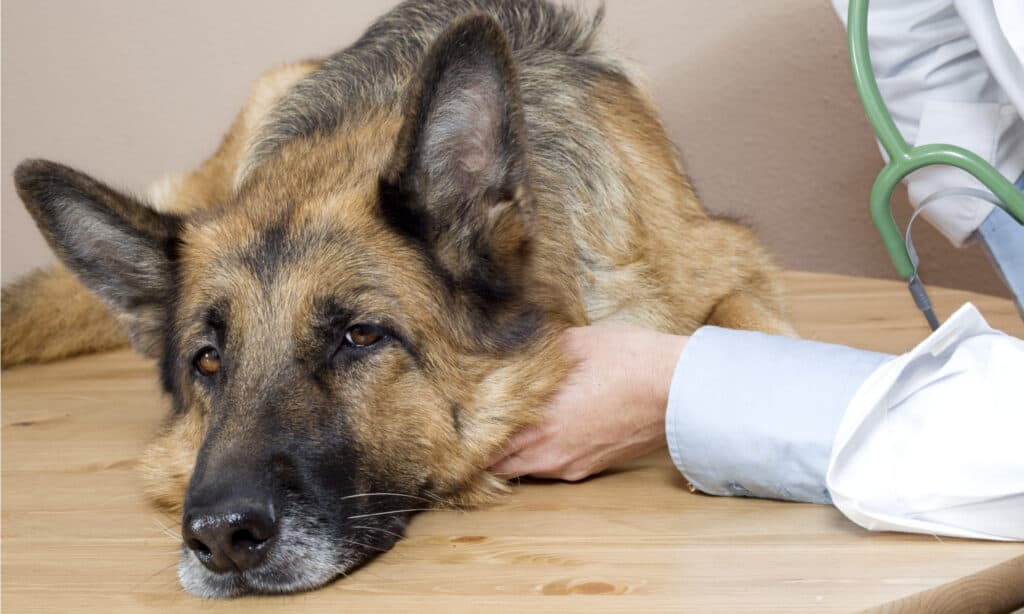
Curious about your German Shepherd’s pregnancy? Observe telltale signs such as abdominal enlargement, changes in appetite, and nesting behavior. Remember, consult a veterinarian for accurate confirmation and proper prenatal care.
©Roger costa morera/Shutterstock.com
Abdominal Palpation
Palpation is among the easiest ways to confirm your German Shepherd is pregnant. Your veterinarian will touch your dog’s abdomen to feel fluid-filled sacs that usually form as the fetus develops in the animal’s womb. Even so, this method is only ideal between the third and fifth week as the sacs might not be felt earlier than that.
Ultrasound
Medical professionals also leverage ultrasounds to test if German Shepherds are pregnant. Thankfully, this procedure goes the extra mile and checks the fetus’ heartbeat to confirm it’s healthy. If an ultrasound reveals your German shepherd’s fetus is dead, the best action is to mummify it while it’s still in the uterus.
X-Ray
An X-Ray is another easy way to test if your German Shepherd is pregnant. This method also reveals the number of puppies the dog carries, helping you prepare for their arrival.
Unfortunately, an X-Ray is only applicable if your furry pal is at least 42 days pregnant. The canine’s bones might not even be visible before that stage.
Hormone Tests
Your veterinarian can test for relaxin to confirm your furry buddy’s pregnancy. The hormone is only released during embryo implantation and is easily detected in the blood as early as three weeks into the gestation period. Nonetheless, this hormone test might result in a negative if your German shepherd is only a week or two pregnant.
German Shepherd Pregnancy: Weekly Milestones
Supposing your German shepherd is pregnant, here are the changes you should expect during the gestation:
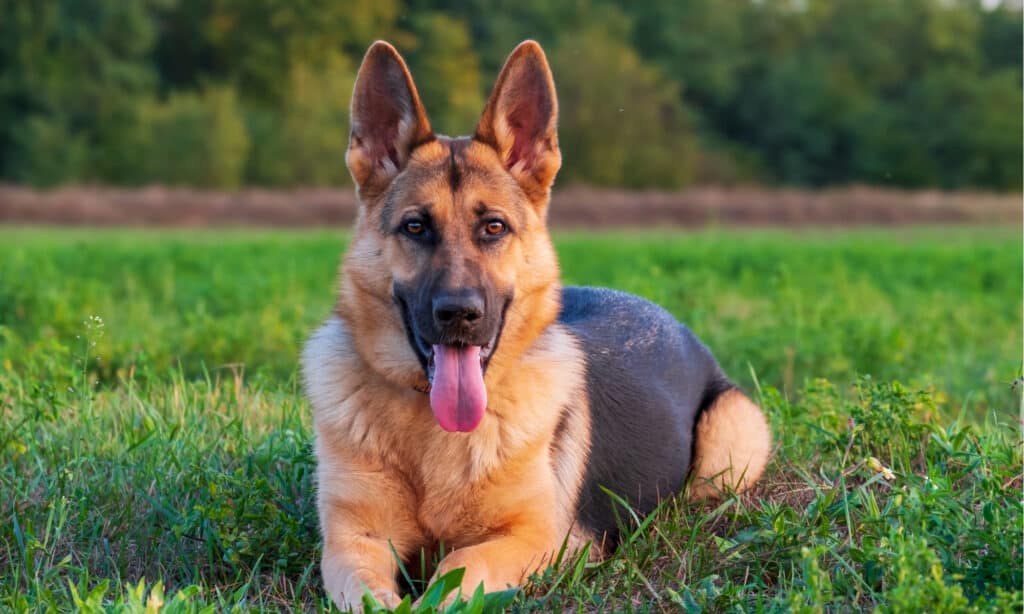
From conception to birth, each week brings new developments and changes for both the mother and her growing puppies.
©Barat Roland/Shutterstock.com
Week 1-3
During the first few days of breeding, the eggs undergo fertilization after the sperms reach them. That will first see the German shepherd’s reproductive system ready for pregnancy. Be that as it may, the animal won’t show any signs or changes in behavior, meaning you might not even know more members are about to join the family!
The fertilized eggs develop and move towards the uterus lining for implantation during week two of the German shepherd’s pregnancy. Still, the canine will not exhibit any physical transformations, but it might grow more irritable or affectionate.
While the first two weeks of a German shepherd’s pregnancy have no noticeable physical changes, the third week differs. The embryos have already begun developing, with parts like the nervous system and the placenta being formed by the end of it. Your furry pal’s body, behavior, and lifestyle will change. You’ll see its nipples growing and pinker while its appetite shoots through the roof or drastically declines due to morning sickness.
Week 4-6
Week 4 is one of the most crucial stages of a German shepherd’s pregnancy. The fetus continues developing more body parts, such as vital organs, facial features, and limbs. Therefore, the canine’s body adapts to its new condition, making it less active. Moreover, the dog will likely experience morning sickness daily, vomiting, and urinating more often than usual.
These symptoms will encourage you to take the animal to a veterinarian to test if it’s pregnant.
Week 5 marks the end of the German shepherd’s first pregnancy stage, embryogenesis. Because the fetus has already formed and is growing, the dog’s appetite will soar as it gains more pounds. With a good stethoscope, you might hear the puppies’ heartbeats. An ultrasound will show their vague shape and sex organs.
In week 6, the puppies will continue to grow, gaining weight almost as rapidly as their mother. Their claws will form, and their heads will grow some fur. But although their eyes will have lids, they’ll still be shut. At the same time, the German Shepherd’s discomfort will increase due to the pressure its body feels. You might also notice some clear vaginal discharge and a dramatic increase in size in the canine’s nipples as they prepare for milk production to feed the puppies.
Week 7-9
By week 7, the German shepherd’s belly will be much larger because the puppies are fully grown — you might notice their movement inside! On top of that, the canine will start shedding fur around the stomach in preparation for birth, begging you to do the same by securing a whelping box, a safe, comfy place for the animal to nest and await the arrival of its young.
During week 8, all the puppies have fur and solid skeletons. Since they’re also fully developed and ready to join our world, they start moving towards the German shepherd’s birth canal. At this stage, the canine will be restless and spend most of its time digging in the whelping box. Because the puppies constantly press the dog’s abdomen, it’ll eat less while its nipples enlarge and lactate.
In week 9, we’re in the home stretch! It’s the final stage of the German shepherd’s pregnancy, and the puppies are ready to be born. The pet will likely be uneasy and irritable, so you should keep your young kids away. Make all efforts to maximize her comfort and monitor her closely for changes in rectal temperature.
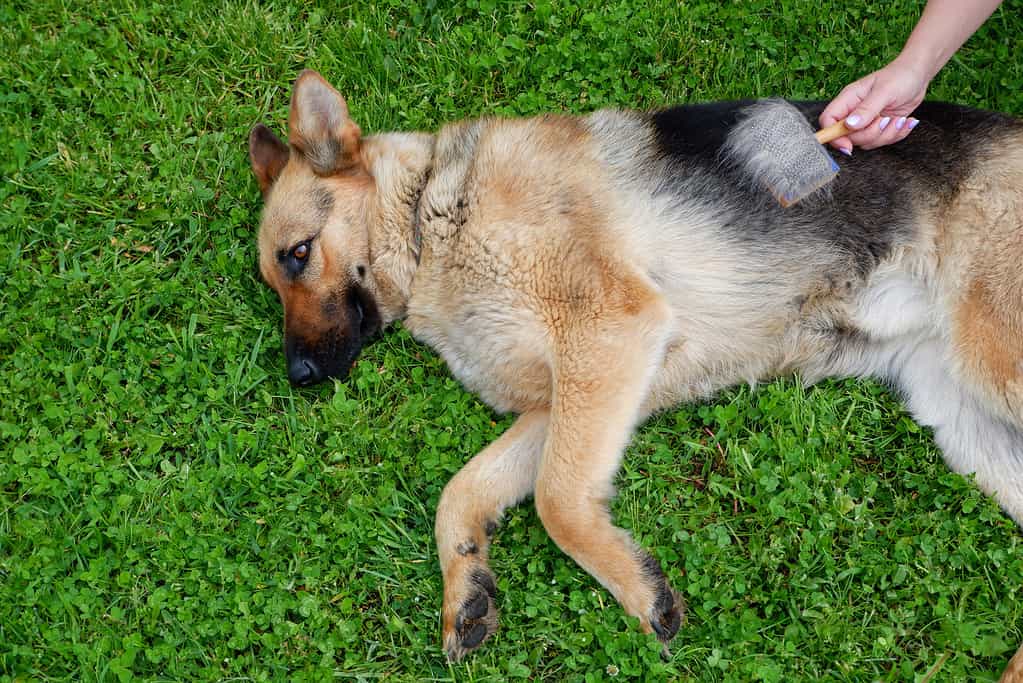
The enchanting world of a pregnant German shepherd in weeks 7-9, where rapid growth and significant milestones mark this stage of canine pregnancy.
©iStock.com/Ana-O
Can You Help Your German Shepherd Give Birth?
German shepherds don’t usually need help whelping; you don’t have to watch or examine them. But that’s not to say you should do nothing to make it easier for the canine. We recommend providing a clean environment for the dog as it prepares to give birth to the entire litter in about six hours. Also, close its kennel’s windows and door to minimize noise distractions, and don’t allow anybody to enter the room unless the canine is already familiar with them.
However, something could be wrong if your German shepherd spends more than 24 hours in labor. Call a veterinarian to examine the canine and prevent complications after birth. Other problems that may arise during whelping and require the help of the professional are:
- Dull mood
- Excessive bleeding
- Vulva produces a green discharge
- Exhaustion during labor and eventually stops straining
- Straining for up to 30 minutes or more, but there’s no puppy in sight
- Dog gives birth to puppies that aren’t moving or breathing
- The puppy is partly out, with the rest of its body stuck inside
- Your pregnant German Shepherd shows no signs of labor after nine weeks
Caring for Your Pregnant German Shepherd: Top Things To Do
As a German shepherd parent or breeder, your job is to ensure the canine receives the best care during and after pregnancy. How can you do that? Keep reading to find out!
1. Maintain Proper Nutrition
Your German shepherd’s diet is critical while pregnant as it affects its health and the puppies’. Feed the canine quality, protein-rich adult food with fats and minerals. Also, remember its appetite will likely spike during the period, so you’ll want to ensure it eats at least twice daily.
Never withhold food from a pregnant German shepherd, as it could cause the birth of weak, unhealthy puppies. We suggest you consult your local vet to learn the best treats to throw into its feeding bowl.
Again, monitor your German shepherd to know when the morning sickness begins. Because it’s likely to vomit a lot at that stage, feed it smaller amounts more often throughout the day. You can also add some dietary supplements to its diet, but beware of options with high calcium content, as too much of the mineral causes weakness, loss of appetite, and frequent urination.
2. Exercise Your German Shepherd
Pregnant German shepherds also need low-intensity exercise to stay fit, energetic, and strong enough to give birth once the gestation period elapses. Outdoor activity is great because it allows them to soak in vitamin D, enabling their kidneys to preserve the right amount of calcium.
However, we recommend indoor activities between weeks 6 and 9 to separate the canine from others, protecting it against illnesses and parasites that could derail its health. Additionally, ensure that your activities are non-strenuous to avoid stressing the dog. Here are some simple exercises for pregnant German shepherds:
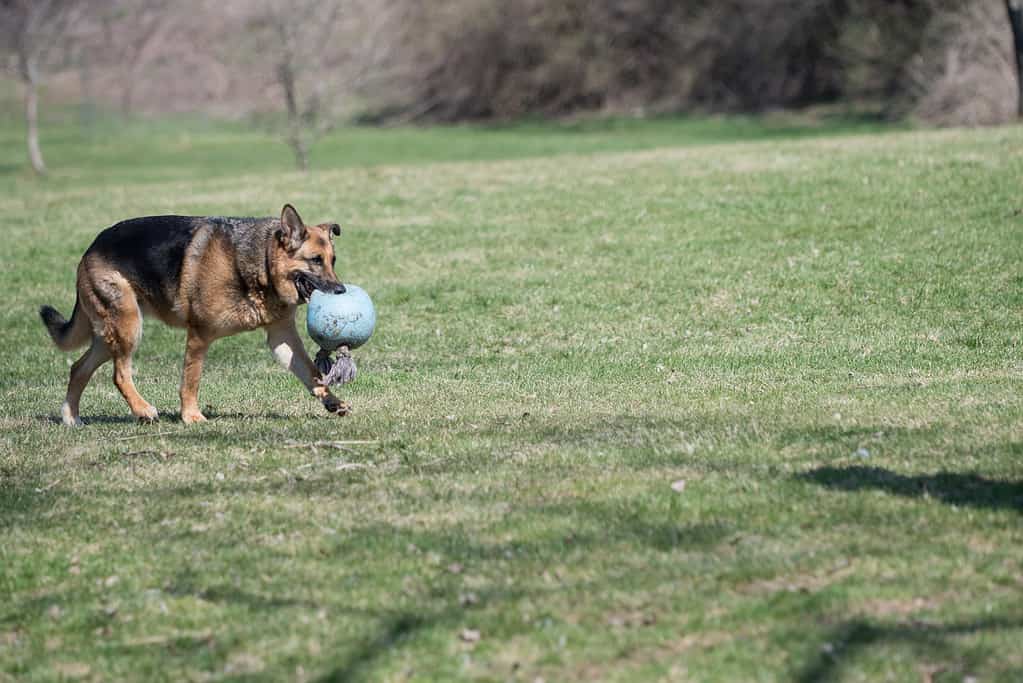
Exercise is vital for her physical and mental well-being, promoting a healthy recovery after nurturing her adorable puppies.
©iStock.com/Kyle Reynolds
Fetch
Most dog breeds love playing fetch because it’s gratifying, and they enjoy their owner’s undivided attention. Well, pregnant German shepherds aren’t any different. Playing fetch allows them to have more than just fun; it strengthens their muscles, preparing them for the challenging task ahead.
Swimming
Plunging into the water is another fantastic exercise for pregnant German shepherds. Because it’s a low-impact activity, they don’t strain themselves to partake in it and enjoy all its amazing perks. These include a fitter body, lower stress levels, and better cardiovascular health, contributing to a smoother whelping experience. Remember that not all German shepherds enjoy swimming. Hence, if yours doesn’t, let it be and explore alternatives like short walks and fetch.
Be Affectionate
German shepherds grow grumpier as their pregnancies progress. Plus, they’re also tired and thirsty around the clock. Ensure they have a safe, cozy environment at home to enable them to rest as much as they need. The animals appreciate some alone time, so avoid bothering them or trying to play all day.
Before birth, create a secluded area for your German shepherd and always keep it tidy and dry. In addition, see to it that kids and other family members don’t go near the animal, giving it the calm environment it craves.
Furthermore, postponing family gatherings or visits to your home is an excellent idea as it limits interactions with scents and people the canine is unfamiliar with. Don’t forget to remind your kids that the beloved family pet is expecting some puppies and encourage them to be gentle when handling it.
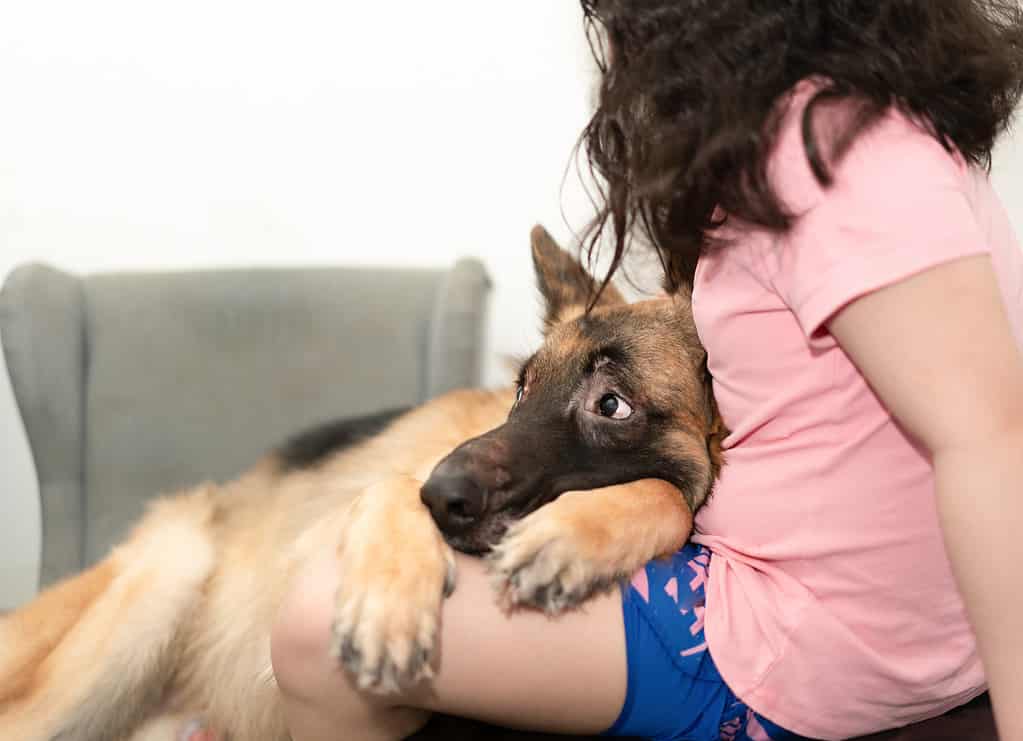
The tender moments of love and connection after a German shepherd mother has given birth, strengthen the bond between human and canine, offering comfort and reassurance during this special postpartum period.
©iStock.com/Vacharapong Wongsalab
Your Pregnant German Shepherd Deserves Top-Notch Care
German Shepherds are hailed as one of the most cherished members of the large dog family. Caring for them during their pregnancy is the best you can do to appreciate their loyalty, not to mention other admirable traits, like intelligence and gentleness.
As you care for your German shepherd during gestation, educate yourself on some issues that may arise after birth. For instance, many of these dogs experience mammary problems or mastitis after whelping, causing mothering challenges, infection of the womb, and incapability to produce enough milk for the puppies. Be sure to consult your vet to understand how to deal with these issues – if they arise – to enhance your furry pal’s well-being.
The photo featured at the top of this post is © Canna Obscura/Shutterstock.com
Ready to discover the top 10 cutest dog breeds in the entire world?
How about the fastest dogs, the largest dogs and those that are -- quite frankly -- just the kindest dogs on the planet? Each day, AZ Animals sends out lists just like this to our thousands of email subscribers. And the best part? It's FREE. Join today by entering your email below.
Thank you for reading! Have some feedback for us? Contact the AZ Animals editorial team.







